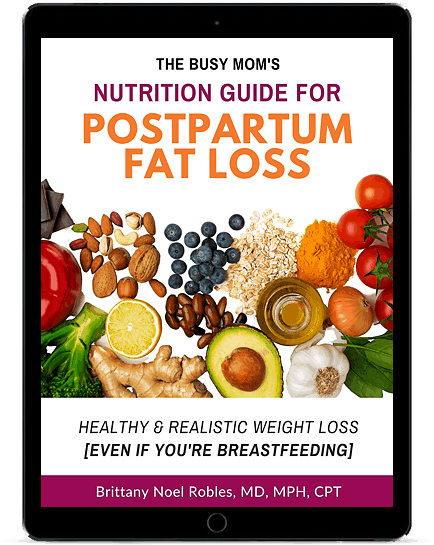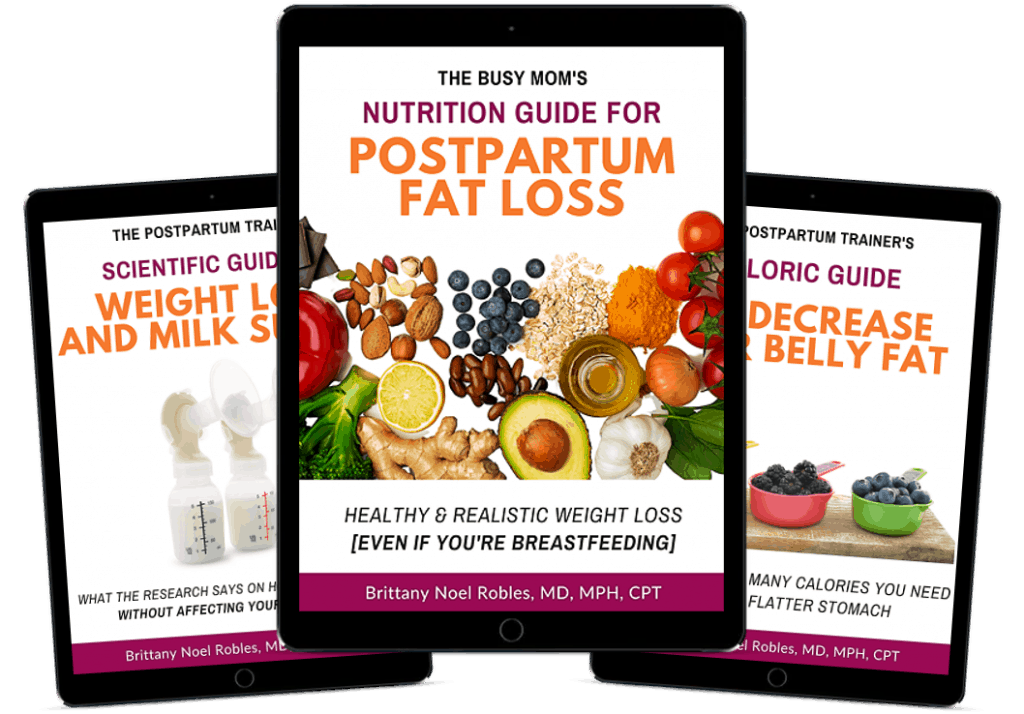Did you just have a baby and you’re wondering what your postpartum weight loss timeline will look like?
In this post, you will learn:
- How much weight you should expect to lose week by week,
- A proven postpartum weight loss plan, and
- What you need to know about weight loss while breastfeeding.
Keep reading!
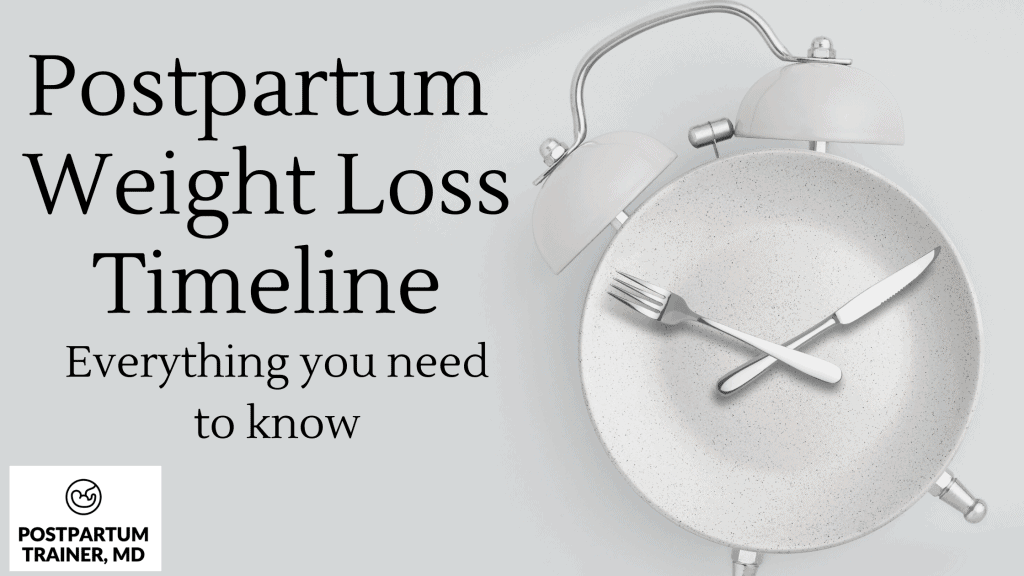
How long does it take to lose weight postpartum?
Postpartum weight loss is a slow process that often takes 6-12 weeks or more. Weight loss will be fastest in the first week and gradually slow down overtime.
Let’s go over this in more detail.
The Postpartum weight loss Timeline (Week by week)
How much weight can you expect to lose week to week after delivering your baby?
Below is a realistic postpartum weight loss timeline.
Postpartum weight loss week 0-1:
Immediately following delivery, you can expect to lose about 10-15 lbs.
This is assuming your baby was born full-term, was not large for gestational age and you did not have polyhydramnios (an increased amount of amniotic fluid).
**Of note, this is the only time that you will ever lose this much weight in such a short period of time.**
It is also during this time period where some women may experience a loss of appetite which can also contribute to weight loss.
Postpartum weight loss weeks 2-6:
In these next few weeks, the weight loss will be slower, which is expected.
With that said, the average weight loss by 6 weeks postpartum is about half of your pregnancy weight gain, regardless of your starting BMI.
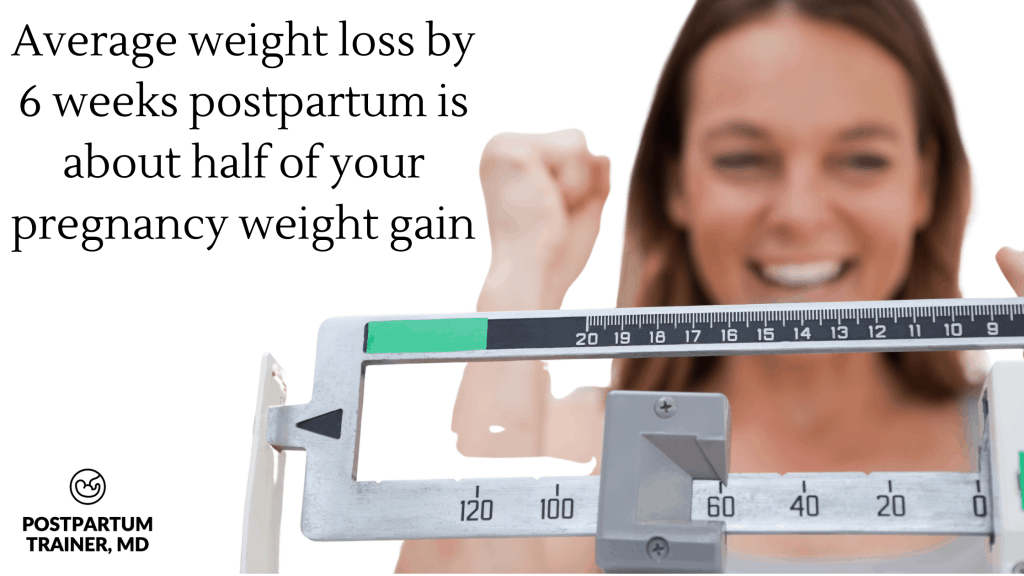
Keep in mind that this is just an average.
If you don’t lose half of your pregnancy weight gain by 6 weeks, that is okay!
Everyone experiences weight loss at a different rate and you should not compare yourself to others.
Postpartum weight loss weeks 6-12
In postpartum weeks 6-12 the weight loss will be even slower.
By now, your uterus should have returned to its pre-pregnancy size.
If you haven’t lost as much weight as you would like, all hope is not lost!
To help boost your weight loss efforts, you could start engaging in regular physical activity. But before doing any type of exercise postpartum, you need to receive clearance from your healthcare provider.
Beyond 12 weeks
After 12 weeks, you probably wont see any further pregnancy related weight changes. At this point, your bodyweight changes will simply be a reflection of your current metabolism.
They found that women who were overweight or obese continued to lose a minimal amount of weight on average up to 2 years.
However, women who fell into the Stage II and Stage III obesity category, actually gained weight from 12-24 months postpartum.
The good news is: there is plenty that you can do to take control of your body.
Let me show you how.
Why is postpartum weight loss so hard?
Postpartum weight loss is difficult because there are many different hormonal factors that can change your metabolism and physiology.
For example, new mothers have high prolactin levels from milk production, which may be associated with weight gain.
In addition to this, there are more demands on your body as you take care of a new baby. This will have a negative impact on your sleep pattern and caloric intake.
All of these factors combined will make weight loss difficult as you adjust to new hormone levels after pregnancy, as well as adjusting to taking care of a newborn baby.
This postpartum weight loss chart depicts the 5 most important factors that will contribute to your weight loss in the postpartum period.
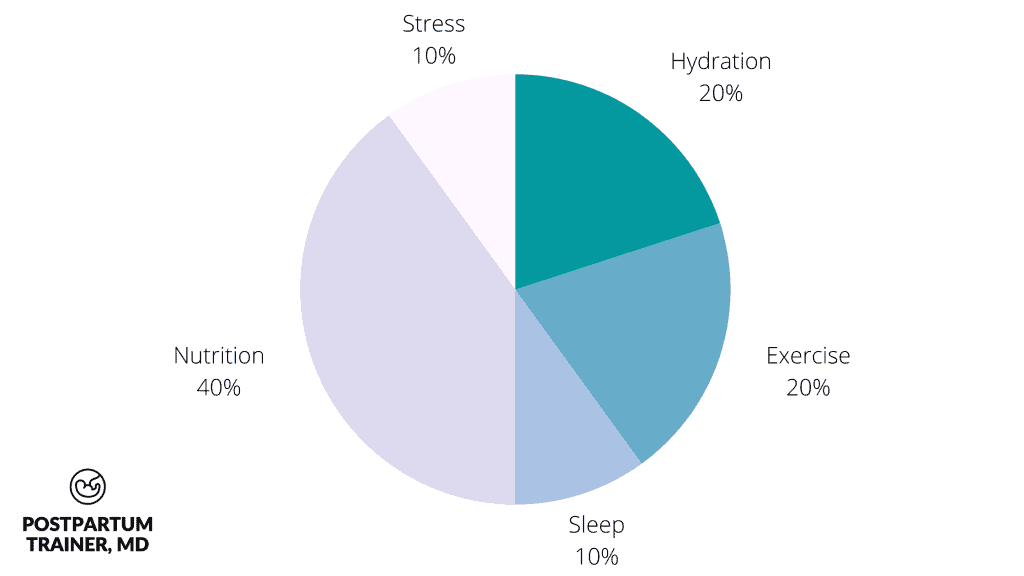
As you can see, some factors are more important than others, but the chart isn’t complete without all of these things.
Let’s go over them one by one.
5 Things To Help You Lose Weight Fast After Having Your Baby
The 5 most important factors to maximize your postpartum weight loss are:
- Your postpartum nutrition and food intake
- Postpartum physical activity
- Achieving adequate levels of hydration
- Improving sleep quality
- Stress control
Let’s cover them in more detail.
Your Postpartum Nutrition Plan
Improving your nutrition and reducing junk food is the best way to lose weight quickly.
As you can see from the chart, your nutrition contributes to at least 40% of your weight loss.
This does not mean that you should follow crash diets.
The best postpartum diet is one that is varied and contains sufficient quantities of all three macronutrients.
The three macronutrients are:
- Carbohydrates,
- Lean protein, and
- Healthy fat
To maximize your nutrition, you don’t actually have to “diet.”
In fact, the word diet is often counter-productive because it often brings words into your mind like ‘restriction’ and ‘sacrifice.’
The good news is, you don’t need to do any of these things postpartum.
All you need to do is create yourself a sustainable and realistic nutrition plan that is centered around real, nutrient-rich, whole foods.
I have an entire post on how to create a postpartum nutrition plan for yourself which you can check out here.
Or, you can follow the proven postpartum weight loss plan I put together.
Check it out below!
Postpartum Physical Activity
Exercise is one of the best things you could do for your body both in the antepartum and postpartum periods.
Not only does exercise help you lose weight by burning calories, but it can:
- put you in a better mood due to the release of endorphins,
- help you to become stronger, and
- improve your cardiovascular endurance.
With that said, exercise is a smaller piece of the weight loss equation. Exercising without improving your nutrition will not yield optimal results.
The good news is:
I have a ton of postpartum exercise articles that you could find below categorized by topic.
Hundreds Of Postpartum Weight Loss Exercises You Can Do
Postpartum Cardio
Postpartum Strength Training
- Postpartum Kettlebell Workout
- The Postpartum Squat Challenge [How Far Can You Go]
- An Easy Postpartum Workout for Beginners
- A Simple Post C-Section Workout Plan
Lower Body Strength Training
- 9 Easy Leg Exercises for Pregnant and Postpartum Women
- Underbutt Isolation Exercises to Build A Stronger Booty
Upper Body Strength Training
- 9 Amazing Chest Exercises for Saggy Breasts
- The Best Arm Toning Exercises for Pregnant and Postpartum Women
Core Training
This leads me to the next point – as it is always important to stay hydrated as you are exercising.
Here’s how to tell if you are drinking enough water.
Staying Well Hydrated Postpartum
Water is extremely important in the postpartum period, especially if you are breastfeeding.
It is necessary for just about every metabolic process to occur in your body, and it can actually help you lose weight.
The good news is:
It’s super easy to add water into your daily routine.
All you have to do is drink a tall glass of water before each meal.
This will help:
- fill up your stomach to decrease hunger cues,
- help you burn calories (via water-induced thermogenesis), and
- decrease the chances of you over drinking high-calorie liquids.
So how much water should you drink?
Don’t focus on the number of ounces you are drinking, but rather focus on the color of your urine throughout the day.
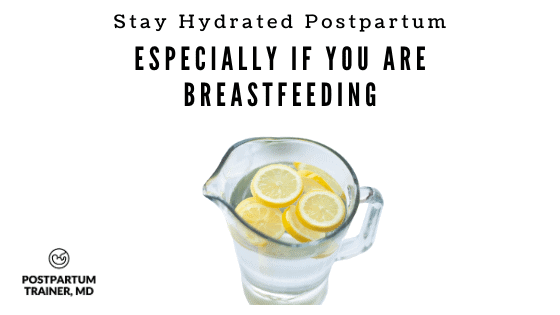
This is the best measure of hydration levels in your body.
Your urine should be a pale yellow color.
If your urine is a dark yellow color, you need to drink more water.
If there is no color to your urine and it is clear, slow down on your water consumption.
Postpartum Restoration
One forgotten factor in postpartum weight loss is sleep and restoration.
Sleep is so important for a healthy metabolism, and it’s obviously something many mothers are deprived of.
Are you aware that sleep deprivation can increase your risk of weight gain?
This makes sense.
When you are awake, your body is in a catabolic state, constantly burning energy, and often entering “fight or flight” states. These stressful states are when your body releases high levels of cortisol.
Your body interprets sleep deprivation as another form of “fight or flight” keeping cortisol high while increasing the production of glucose and storage of fat.
I know it’s hard.
But you must do your best to get some rest.
Try napping whenever your baby is asleep.
You could also divide the night into shifts with your partner so that you could sleep for a few hours uninterrupted.
You could even ask your family and other loved ones for help once in a while.
Stress Control
Last but not least, stress is another factor you must pay attention to for weight loss.
Stress is certainly a contributor to weight gain, and studies have found links between high stress, altered dietary patterns, and obesity.
This is because high-stress levels promote the production of cortisol which is known as the stress hormone.
This has actually been proven in studies to inhibit weight loss by increasing your food cravings.
We both know that the postpartum period is one of very high stress.

That is why it is so important to pay attention to what you are eating when you are stressed out, and to find ways to help manage your stress.
This is another reason why postpartum exercise is so beneficial!
Also, instead of going for those highly processed sugary snacks, try one of these 17 healthy snacks.
Other Related Questions
What should I do If I experience a postpartum weight loss plateau?
Everyone will experience a plateau in postpartum weight loss.
This is because our body is so good at adapting to change.
When you start a new routine (like a new diet plan or a new workout program), your body gets exposed to something different and has to change to meet the needs of the stimulus.
It’s like anything in life. Eventually your body will get used to whatever it is you are doing.
The same is true for weight loss. You cannot expect your body to keep adapting if the stimulus never changes.
To overcome any plateau, you must provide your body with a new stimulus.
You can do this by changing up your exercise regimen to burn more calories, or make a change in your current nutrition intake.
That is why it is so important to not go “all out” right from the beginning.
It is best to allow your body to make changes gradually.
And this is exactly why I created the Postpartum Trainer’s Nutrition Plan. Every few weeks your body is provided with a new stimulus that it must adapt to.
This is what will give you long lasting results.
The relationship between breastfeeding and weight loss
Another important thing to consider is that you can lose weight while breastfeeding.
It just needs to be done the correct way, so that your milk supply is not affected.
Interestingly, many women will notice weight loss just from breastfeeding alone, without doing anything else.
The reason is because breastfeeding burns calories!
Anywhere from 300-500 calories per day depending on how often and for how long you are breastfeeding.
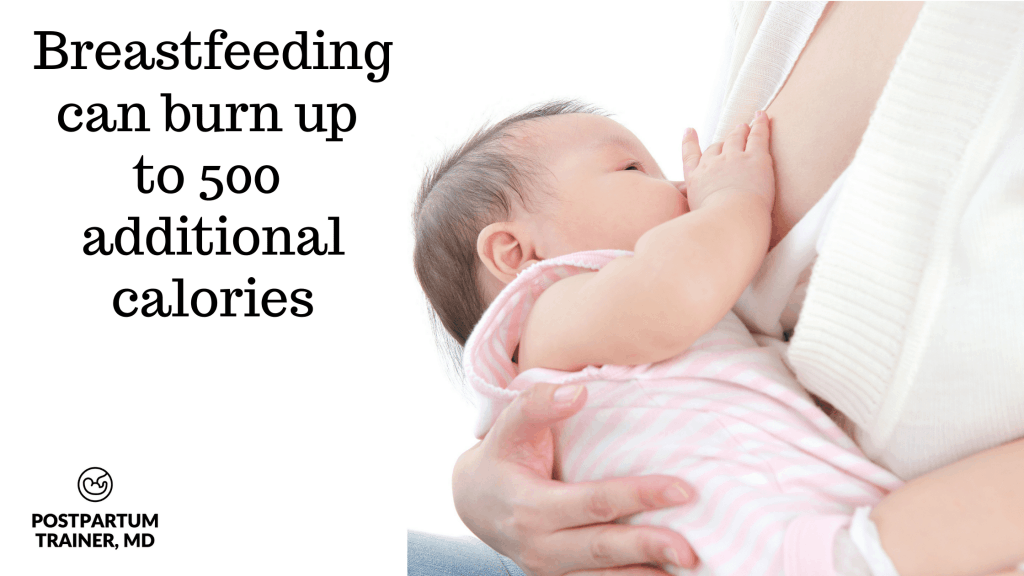
Not only does breastfeeding burn calories, but it also helps to contract your uterus.
The contractions that occur in the uterus, postpartum, help the uterus return to its pre-pregnancy size faster.
If you would like to learn more on breastfeeding and weight loss, I have created an entire article discussing 7 tips you should do to lose weight while breastfeeding, and I even have created The Definitive Breastfeeding Meal Plan which outlines the foods you should and should not be eating for maximal weight loss.
My Postpartum Weight Loss Plan While Breastfeeding
I go over all of this in more detail in my Postpartum Trainer’s Nutrition Guide.
You’ll learn what to eat to to lose fat safely without affecting your breast milk supply in one of the free bonuses: The Scientific Guide on Weight Loss and Milk Supply.
You’ll also learn the key to developing long-term healthy habits so that you can be more present for your family!
Check it out below!
Are There Any Postpartum Weight Loss Supplements You Recommend?
Weight loss is primarily a function of your nutrition, calorie intake, and calorie expenditure. Unfortunately, supplements will not help you with any of these important factors.
Instead, I recommend that you focus on your nutrition, making one small change at a time!
Final Words on Postpartum Weight Loss Timeline
Weight loss in the postpartum period requires a multi-faceted approach of
- eating healthy foods,
- regular exercise to increase your lean muscle mass,
- hydrating your body,
- reducing the amount of stress you have, and
- getting quality sleep.
Every one is different and will experience weight loss at a different rate.
You must be patient and you must give your body the time it needs to heal before introducing the stress of weight loss.
Now I want to hear from you.
What has your strategy for postpartum fat loss been?
Comment below and let me know.
Related Posts on Postpartum Weight Loss
- An Easy Postpartum Diet for Busy Moms (To Help You Lose The Baby Weight)
- How to Lose Weight After A C-Section {Everything You Need To Know]
- How To Get Rid of The Post-pregnancy Belly Pooch
Get Four Free Workouts To Help Strengthen Your Pelvic Floor & Heal Your Mommy Tummy!

Brittany Robles, MD, MPH, CPT
Brittany Robles is a full-time OBGYN physician, a NASM certified trainer, and a prenatal and postnatal fitness specialist. She holds a Master of Public Health degree in maternal health with a special interest in exercise and nutrition. She is also the co-author of The White Coat Trainer. Learn more about her here.
Sharing is Caring – Send This To A Mom In Need!
References:
- Gunderson EP, Abrams B, Selvin S. Does the pattern of postpartum weight change differ according to pregravid body size? Int J Obes Relat Metab Disord. 2001 Jun;25(6):853-62. doi: 10.1038/sj.ijo.0801631. PMID: 11439300.
- Sobrinho LG, Horseman ND. Prolactin and human weight disturbances: A puzzling and neglected association. Rev Endocr Metab Disord. 2019 Jun;20(2):197-206. doi: 10.1007/s11154-019-09503-1. PMID: 31062250.
- Østbye T, Peterson BL, Krause KM, Swamy GK, Lovelady CA. Predictors of postpartum weight change among overweight and obese women: results from the Active Mothers Postpartum study. J Womens Health (Larchmt). 2012;21(2):215-222. doi:10.1089/jwh.2011.2947
- Vij VA, Joshi AS. Effect of ‘water induced thermogenesis’ on body weight, body mass index and body composition of overweight subjects. J Clin Diagn Res. 2013;7(9):1894-1896. doi:10.7860/JCDR/2013/5862.3344
- Beccuti G, Pannain S. Sleep and obesity. Curr Opin Clin Nutr Metab Care. 2011;14(4):402-412. doi:10.1097/MCO.0b013e3283479109
- Scott KA, Melhorn SJ, Sakai RR. Effects of Chronic Social Stress on Obesity. Curr Obes Rep. 2012;1(1):16-25. doi:10.1007/s13679-011-0006-3

